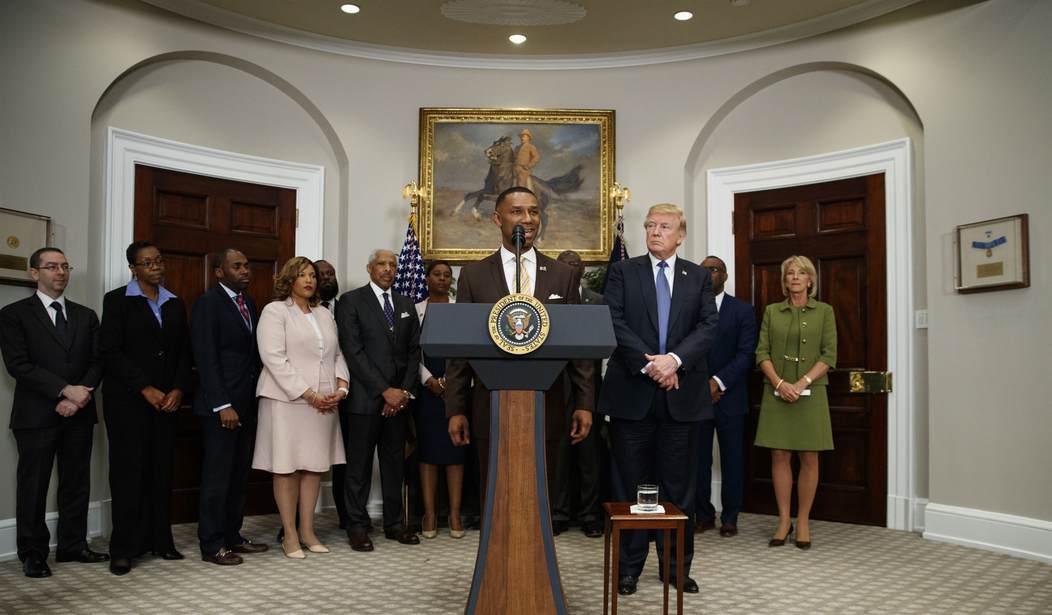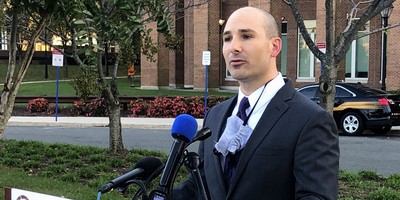With all the talk about seemingly irreconcilable differences between Americans of varying races, it might be helpful to focus on something that unites us all—the American dream of creating a better life for ourselves and our families.
What every American has in common is not just that goal, but also the pathways—education and job training. Still, it’s true that the Black community has faced unequal challenges along both pathways. Instead of fruitless and divisive demands for reparations, we must work together to ensure that all Americans have equal access to those paths forward.
President Trump’s policies pursue just that.
First, let’s look at education. Too many Black students are trapped in underperforming school districts. Black parents overwhelmingly want school choice (even if they’re Democrats). According to USA Today, 89% of Black respondents who voted in Democratic primaries support expanding “access to more choices and options within the public school system, including magnet schools, career academies and public charter schools.”
And 72% of Black parents were in favor of vouchers, the newspaper reported. Vouchers (as defined in the survey) would allow tax dollars to follow the student, enabling parents to choose their child’s school—even if it’s a private school.
“A child’s zip code in America should never determine their future, and that’s what was happening,” President Trump said in June. “So we’re very, very strong on school choice.”
Recommended
American schools shut down last spring because of the COVID-19 pandemic, and many have yet to open for in-person schooling. We know that’s hard on all U.S. families, but harder still on Black students and other students of color. Online-only learning has widened the gaps between white students and minority students.
That’s why President Trump has urged schools to safely reopen for in-person learning.
“A recent analysis found that if in-person classes don’t resume until January 2021, Hispanic, Black, and low income students will lose 9.2, 10.3, and 12.4 months of learning, respectively,” the White House pointed out in August.
The president’s support for Black education doesn’t stop at high school graduation.
He worked to restore funding for historically black colleges and universities (HBCUs) in December 2019, after Congress allowed it lapse. And while Congress made sure wealthy private schools like Harvard University could receive funding from the CARES Act, President Trump insisted that HBCUs get the help they need to stay afloat.
Over the past two centuries, private HBCUs have struggled to survive while providing a quality education to one of our nation’s most vulnerable populations. They receive very little support from the states and are almost 100 percent tuition-driven. The $450 million included in the CARES Act has been a lifeline.
Arguably, the most famous HBCU is Tuskegee University, formerly known as the Tuskegee Institute. It was founded by Booker T. Washington—the man whose name and vision grace the institution I lead. As Washington himself said, “Nothing ever comes to one, that is worth having, except as a result of hard work.”
That’s why Washington insisted that Tuskegee teach vocational skills alongside book-learning: “No race can prosper till it learns that there is as much dignity in tilling a field as in writing a poem,” he said.
Job training is the other pathway to success—for all Americans, not just Black Americans. Yet Black families have bought into the myth that all children should go to college and pursue a baccalaureate degree. They have overlooked the good jobs and bright futures offered by the skilled trades.
Workforce development has been a focus of President Trump’s. In his 2018 State of the Union address, the president called for a renewed commitment to career and technical education (CTE).
“Let us invest in workforce development and job training,” he said. “Let us open great vocational schools so our future workers can learn a craft and realize their full potential.”
He followed up that call with a commitment of his own; and the private sector answered his call, as well. He followed up that call with a commitment of his own; and the private sector answered his call, as well. More than 450 organizations have pledged to create 16.3 million new training opportunities in the next five years.
I am a Black American. I am also a father. And because I am a father, I have a connection to every other father—white, Black, Hispanic or Asian. We are all united in our goal of ensuring a better future for our kids.
In these days of great division, let’s not lose sight of that. We all share that American dream.
Richard Johnson III, Ed.D., is the director of the Texas Public Policy Foundation’s Booker T. Washington Initiative which examines the effects of public policy on African-American communities.
Editor's note: This column has been updated.

























Join the conversation as a VIP Member